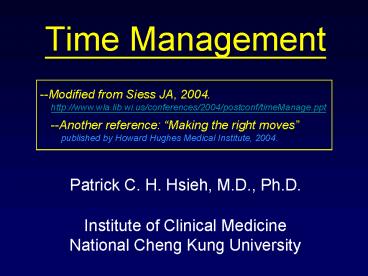Time Management PowerPoint PPT Presentation
1 / 23
Title: Time Management
1
Time Management
--Modified from Siess JA, 2004.http//www.wla.lib
.wi.us/conferences/2004/postconf/timeManage.ppt-
-Another reference Making the right moves
published by Howard Hughes Medical Institute,
2004.
Patrick C. H. Hsieh, M.D., Ph.D.
- Institute of Clinical Medicine
- National Cheng Kung University
2
Time Management
- The first step
- Setting your goal !
3
Setting your goal
- Long-term goal years
- Intermediate-term goal months
- Short-term goal weeks or days
4
Setting your goal
- Long-term goal 3-5 years
- Who do you want to be and how?
- e.g. an academic, applied or industrial
job? PhD and postdoc? - 2. What do you need to accomplish to make
yourself competitive? - e.g. for an academic job, how many papers?
5
Setting your goal
- Intermediate-term goal 6-12 months
- Revising a paper
- Putting together a poster
- Collecting preliminary data for a grant
- Organizing a meeting
- 5. Passing your qualifying exam
6
Setting your goal
- Short-term goal 1 week to 1 month
- The small, concrete, finite tasks that swallow
your time - e.g. preparing figures for the paper you are
writing, completing an experiment - If hard to organize, make a daily or weekly to-do
list and check tasks off after done
7
Setting your goal
- Must be concrete.
- Must be measurable.
- Must be in writing.
- Must be achievable.
8
Listing your tasks
- Steps required to achieve the goals.
- Prioritize.
- Set deadlines.
- List resources needed.
- Keep your eye on your goals.
9
Prioritization
- Just because you can do something doesnt mean
you should.
10
Question things !
- Whats the objective?
- How will I know if I am successful?
- How will I be rewarded?
- Is this task something I want to do?
- Do I have the time to do it?
- What have I got to lose?
- Is there a better way to do it?
- Should it even be done at all?
- Will the world come to an end if?
11
Time management grid
12
Time management grid
13
Time management grid
14
Time management grid
15
Time management grid
16
Time management grid
This is the key !
17
Ten myths about time
- Time can be managed.
- The harder you work, the more you accomplish.
- If you want something done right, do it yourself.
- You arent supposed to enjoy work.
- Take pride in working hard.
- Try to do the most in the least amount of time.
- Use technology to do it better and faster.
- Do one thing at a time.
- Handle paper only once.
- Get more done and you will be happier.
18
Manage your time day-to-day
- Steps required to achieve the goals.
- Prioritize.
- Set deadlines.
- List resources needed.
- Keep your eye on your goals.
19
Time wasters
- Attempting too much.
- Not saying No.
- Incomplete information.
- Management by crisis, fire fighting.
- Interruptions.
20
Making the best use of time
- You dont have to please everyone.
- Let go dont be a perfectionist.
- Resist to do small, insignificant tasks too well.
- Outsource what you can.
21
Interruptions.
- If no one asked questions we wouldnt have jobs.
- Anticipate the most common questions.
- Close your door or arrange your office to
discourage drop-ins. - If all else fails, hide!
22
So, how to improve your time management skills?
- Establish clear goals early, starting with simple
tasks, correcting as appropriate, expanding the
tasks, then repeating the process. - Seek advice. Train yourself to describe projects,
issues, and problems accurately and efficiently. - Stick to the agenda of meeting. Train yourself
for efficient scientific presentations. - Keep meeting minutes and file your to-do lists.
23
How to be successful?
- You need to be smart, or make yourself smarter.
- You have to work hard, very very hard.
- You had better be lucky.
Remember, Opportunities favor the prepared mind
!

